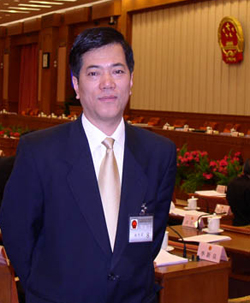|

A file photo of Shi Zuolin, a deputy to the National People's Congress
|
Huge amounts of waste are being discharged from laboratories and pose a major threat to the environment and people's lives, according to a National People's Congress (NPC) deputy. Shi Zuolin made the claim at a NPC group discussion, Xinhua News Agency reported on March 10.
Shi said the government needs to pass legislation to regulate the management of laboratory waste.
"Laboratory pollution is not a big public issue like air pollution or water pollution, but its consequences can be shocking beyond imagination," said Shi, who is vice director of the Fujian Provincial Hospital for Women and Children. "Blood, urine, feces, biological reagents and radiation are discharged from laboratories, and cannot be ignored."
Shi cited the case of a university in Fujian Province. Of the 16 colleges and departments of the university, 12 discharge pollutants from their laboratories. In addition, 28 or nearly 60 percent of the pollutants are on a state list of 47 hazardous waste materials.
"There are more than 400 laboratories in scientific research institutes, hospitals, universities and colleges in Fuzhou alone, capital city of the province, and the amounts of discharged pollutants are quite shocking," said Shi.
China has no current legislation specifically regulating the discharge of pollutants from laboratories and standards are set in an ad hoc manner.
"Few laboratories treat waste before discharging it," Shi said. "It is difficult to control pollution since laboratories produce so many variants, and funds are short."
Shi called for legislation regulating laboratory discharges. "They should classify biological and chemical laboratories; define regulations covering laboratory technology; promote green chemistry and poison-free reagents; and carry out waste treatment in an organized, centralized and effective way."
(China.org.cn by Li Jingrong, March 10, 2009)